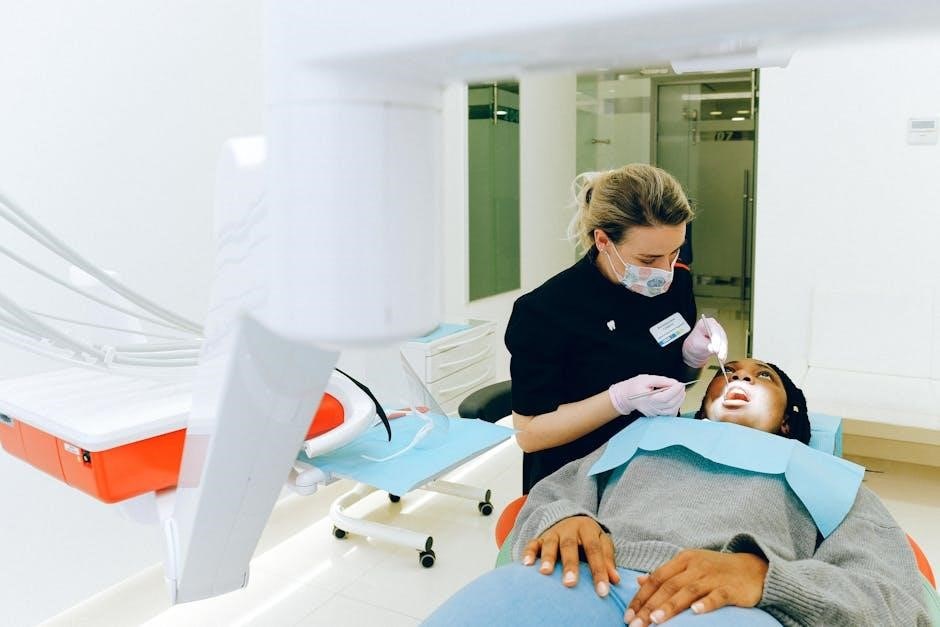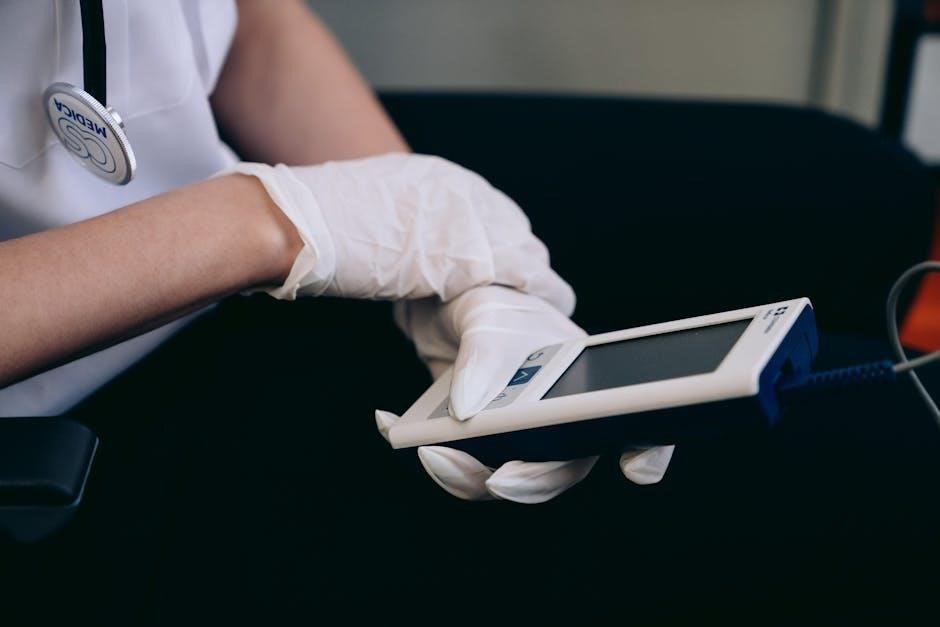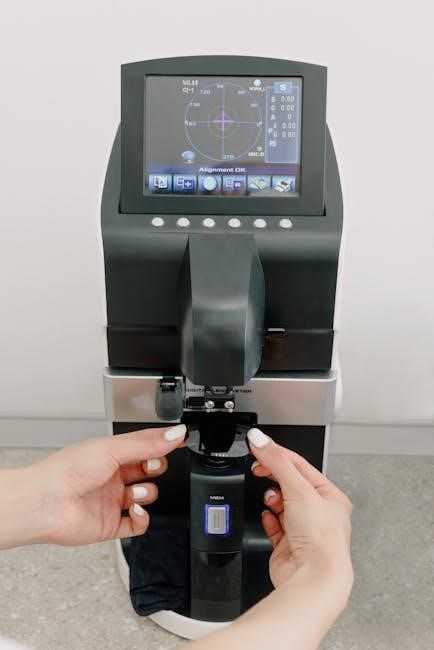The Medical Terminology Final Exam is a comprehensive 200-question assessment evaluating knowledge of prefixes, suffixes, root words, and combining forms. It tests understanding and application skills.
What is Medical Terminology?
Medical terminology is the standardized language used to describe medical conditions, procedures, and treatments. It consists of prefixes, suffixes, root words, and combining forms that create specific medical terms. This system allows healthcare professionals to communicate clearly and accurately about patient care, diagnoses, and therapies. Understanding medical terminology is essential for documenting patient records, interpreting lab results, and ensuring effective communication across healthcare settings. It serves as the foundation for all medical professions, enabling precise and unambiguous exchange of information. Mastery of this language is critical for students and professionals alike in the healthcare field.
Importance of the Final Exam in Medical Terminology
The final exam in medical terminology is crucial for assessing a student’s ability to understand and apply medical language accurately. It ensures proficiency in using prefixes, suffixes, and root words to decode and construct medical terms. This exam evaluates critical thinking skills, enabling healthcare professionals to communicate effectively and document patient information precisely. Mastery of medical terminology is essential for accurate diagnosis, treatment, and patient care. The exam also reflects real-life scenarios, preparing students for practical applications in healthcare settings. By passing this exam, individuals demonstrate their readiness to use medical terminology confidently and correctly in their professional roles, ensuring clear communication and effective patient care.
Structure of the Final Exam (200 Questions)
The final exam consists of 200 multiple-choice questions designed to test a student’s understanding of medical terminology. The questions are divided into sections, covering prefixes, suffixes, root words, and combining forms. Each question evaluates the ability to analyze and construct medical terms. The exam includes definitions, word-building exercises, and real-life applications. Time management is essential, as students have a limited period to complete all questions. The exam structure ensures a comprehensive assessment of terminology knowledge, preparing students for practical use in healthcare settings. This format allows for an objective evaluation of a student’s mastery of medical language fundamentals.

Understanding the Exam Format
The exam format involves 200 multiple-choice questions testing knowledge of medical terminology, including prefixes, suffixes, root words, and combining forms, ensuring practical application in healthcare settings.
Question Types in the Final Exam
The final exam features diverse question types, including multiple-choice, true/false, and fill-in-the-blank. Multiple-choice questions test understanding of terms, while true/false assesses recognition of correct definitions. Fill-in-the-blank questions require constructing terms from definitions, ensuring active recall and application of knowledge. These formats evaluate both comprehension and the ability to apply medical terminology accurately in various clinical contexts, preparing students for real-world scenarios. The variety of question types ensures a thorough assessment of all key concepts, making the exam a robust measure of a student’s mastery of medical terminology.
Time Management Strategies for 200 Questions
EFFECTIVE time management is crucial when tackling 200 questions. Allocate approximately 30-45 seconds per question to complete the exam within the allotted time. Start by skimming through the entire exam to identify easier questions and answer them first, ensuring no time is wasted on ambiguous questions early on. Prioritize questions you are confident about to secure maximum points quickly. Use the process of elimination for challenging questions, and avoid spending excessive time on a single question. Finally, review your answers before submission to correct any errors. This structured approach ensures efficient use of time and maximizes overall performance.
Scoring System and Passing Criteria
THE scoring system for the Medical Terminology Final Exam is straightforward, with each correct answer typically worth one point, resulting in a total possible score of 200. The passing criteria generally require a minimum score of 70% to 80%, depending on the institution. Achieving this threshold demonstrates satisfactory understanding of medical terminology. Some exams may include negative marking for incorrect answers, while others award partial points for partially correct responses. It is essential to review the specific grading rubric provided by your instructor to understand how your final score will be calculated. Meeting the passing criteria ensures successful completion of the course.

Key Concepts to Focus On
Mastering medical prefixes, suffixes, root words, and combining forms is essential for success. Understanding their meanings and applications ensures accurate term construction and comprehension in medical contexts.
Medical Prefixes and Suffixes
Medical prefixes and suffixes are essential components of terminology. Prefixes often denote location, number, or direction (e.g., hypo- for “under”). Suffixes indicate conditions or procedures (e.g., -itis for inflammation). Mastering these elements helps in constructing and understanding complex terms. Learners should focus on common prefixes like hyper- (excessive) and hemi- (half), and suffixes like -ology (study of) and -ectomy (removal). Regular practice with flashcards and exercises can enhance memorization. Understanding these building blocks is critical for success in the final exam, as they aid in breaking down unfamiliar terms and answering questions effectively. Consistent review ensures proficiency in this foundational area of medical terminology.
Root Words and Their Meanings
Root words are the foundation of medical terminology, often derived from Greek or Latin. They represent the core meaning of a term, such as cardi- (heart) or neuro- (nervous system). These roots combine with prefixes and suffixes to form complete terms. Understanding root words is crucial for deciphering unfamiliar terms. For example, gastr- refers to the stomach, while derm- relates to the skin. Mastery of root words simplifies learning and enhances comprehension; Flashcards and practice exercises are effective tools for memorization. Focusing on common roots ensures a strong grasp of medical terminology, which is essential for success on the final exam. Regular review and application of root words in context solidify their meanings.
Combining Forms in Medical Terminology
Combining forms are modified root words with added vowels to facilitate the formation of medical terms. For instance, cardio- (heart) and neuro- (nervous system) are combining forms derived from root words. These forms are essential for constructing terms like cardiologist or neurosurgery. Understanding combining forms helps in breaking down complex terms into their components, aiding comprehension and memorization. They often appear in exam questions, requiring the ability to identify and interpret them accurately. Practice with flashcards and practice exams can enhance mastery of combining forms, ensuring readiness for the 200-question final exam. This skill is vital for success in medical terminology.

Study Strategies for Success
Combining forms are root words with added vowels, enabling the creation of medical terms. Examples include cardio- (heart) and neuro- (nervous system). They form terms like cardiologist or neurosurgery. Understanding these forms is crucial for breaking down complex terms, enhancing comprehension and memorization. They frequently appear in exams, requiring accurate identification and interpretation. Utilizing flashcards and practice exams can improve mastery of combining forms, ensuring preparedness for the 200-question final exam. This skill is vital for excelling in medical terminology.
Active Recall and Flashcards
Active recall involves actively remembering information rather than passively re-reading it. Using flashcards is an effective strategy for mastering medical terminology. Create flashcards with terms on one side and definitions on the other. Quiz yourself regularly to reinforce memory. Digital apps like Anki allow spaced repetition, enhancing long-term retention. Include prefixes, suffixes, and root words to build a strong foundation. For example, a flashcard might pair “cardio-” with “heart.” Regular practice with flashcards helps identify weak areas and strengthens understanding of complex terms, ensuring readiness for the 200-question final exam. This method is both efficient and engaging, making study sessions productive and focused.
Practice Exams and Mock Tests
Practice exams and mock tests are essential tools for assessing readiness for the Medical Terminology Final Exam. They simulate real exam conditions, helping students familiarize themselves with the format and timing. Mock tests allow learners to identify weak areas and improve time management skills. Regularly taking practice exams builds confidence and reduces exam anxiety. Utilize online resources and study guides to access sample questions and model answers. After completing a mock test, review incorrect answers to understand mistakes and reinforce learning. Consistent practice with these tools ensures a thorough understanding of medical terminology and enhances performance in the final 200-question exam.
Using Online Resources and Study Guides
Online resources and study guides are invaluable for preparing for the Medical Terminology Final Exam. Websites offer practice questions, flashcards, and interactive exercises that reinforce learning. Utilizing study guides provides structured revision materials, ensuring comprehensive coverage of key concepts. Flashcard apps help memorize prefixes, suffixes, and root words efficiently. Additionally, online platforms offer mock tests that simulate exam conditions, aiding in time management and familiarization with question formats. Leveraging these tools enhances understanding and retention of medical terminology, ensuring readiness for the 200-question final exam. Regular use of these resources can significantly improve performance and confidence.

Tips for Answering Questions Effectively
Break down unfamiliar terms into prefixes, suffixes, and root words to decipher meanings. Identify key question components and use elimination techniques for multiple-choice answers to ensure accuracy.
Breaking Down Unfamiliar Terms
Breaking down unfamiliar terms into their components—prefixes, roots, and suffixes—is a crucial strategy for success. Start by identifying the root word, which provides the core meaning. Prefixes and suffixes modify or enhance this meaning. For example, in “hypertension,” “hyper-” means excessive, and “-tension” refers to pressure, combining to describe high blood pressure. Similarly, “arthroscopy” can be dissected into “arthro-” (joint) and “-scopy” (examination), meaning the procedure to examine joints. This method allows learners to decode terms logically, even if they are encountered for the first time. Regular practice with flashcards or practice exams reinforces this skill, ensuring confidence during the final exam.
Identifying Key Components of Questions
Identifying the key components of questions is essential for effective answering. Start by skimming the question to pinpoint the main focus, such as a specific term, concept, or process. Pay attention to action verbs like “define,” “identify,” or “explain,” as they guide your response. Highlight any unfamiliar terms or phrases that require decoding, using your knowledge of prefixes, roots, and suffixes. Additionally, note any contextual clues or examples provided, as they can aid comprehension. Focus on high-value questions first to maximize your score. By systematically breaking down each question, you can approach them with confidence and accuracy, ensuring you address all critical elements. Practice exams help refine this skill, enabling efficient and precise responses during the final exam.
Elimination Techniques for Multiple-Choice Questions
Elimination techniques are invaluable for tackling multiple-choice questions in the Medical Terminology Final Exam. Start by identifying and eliminating obviously incorrect answers, such as terms with unrelated prefixes or suffixes. For example, if a question asks about a condition (suffix “-itis”) but an option ends in “-oma,” it can often be ruled out. Use your knowledge of root words to assess plausibility; if a term’s meaning doesn’t align with the question, eliminate it. Additionally, look for redundant or similar options, as exams often include distractors. If unsure, focus on the question stem and use process-of-elimination to make educated guesses. Regular practice with sample questions refines this skill, boosting confidence and accuracy.

Common Pitfalls to Avoid
Common pitfalls include overlooking prefixes and suffixes, misinterpreting root words, and poor time management. These errors can lead to incorrect answers and lower scores significantly.
Overlooking Prefixes and Suffixes
Overlooking prefixes and suffixes is a common mistake in medical terminology exams. These elements often dictate the meaning of terms. For example, prefixes like “hypo-” (under) and “hyper-” (over) indicate conditions, while suffixes like “-itis” (inflammation) and “-oma” (tumor) denote specific medical states. Ignoring these can lead to misinterpretation of terms, resulting in incorrect answers. To avoid this, thoroughly study and memorize common prefixes and suffixes, as they are foundational to understanding complex medical terminology. Regular practice with flashcards or practice exams can help reinforce this knowledge and improve accuracy during the final exam.
Misinterpreting Root Words
Misinterpreting root words is a frequent error in medical terminology exams. Root words are the core of most medical terms, often derived from Latin or Greek. For example, “cardio-” refers to the heart, while “neuro-” pertains to nerves. Confusing similar-sounding roots, such as “derm-” (skin) and “renal-” (kidney), can lead to incorrect answers. To avoid this, thoroughly study root meanings and practice breaking down terms into their components. Using flashcards or practice exercises can help reinforce root word recognition, ensuring accurate interpretation and application during the exam. This foundational knowledge is critical for success in medical terminology.
Time Mismanagement During the Exam
Time mismanagement is a common issue during the final exam. With 200 questions, allocating 30 seconds per question is crucial. Students often spend too much time on difficult questions, risking incomplete answers later. To avoid this, apply time management strategies like skimming through questions, answering easier ones first, and returning to challenging ones. Use practice exams to simulate exam conditions and improve pacing. Avoid overthinking; make educated guesses if unsure. Proper time allocation ensures all questions are attempted, maximizing scoring potential. Effective time management is essential for success in the medical terminology final exam. Plan your approach to maintain efficiency and composure.

Resources for Preparation
Recommended textbooks, online platforms, and flashcard apps provide comprehensive study materials. Utilize practice exams and guides to enhance understanding and retention of medical terminology concepts effectively.
Recommended Textbooks and Guides
Several textbooks and study guides are highly recommended for preparing for the Medical Terminology Final Exam. Titles such as Medical Terminology for Health Professions and Medical Terminology: A Short Course are popular choices, offering in-depth explanations of root words, prefixes, and suffixes. These resources often include interactive exercises, practice quizzes, and flashcards to reinforce learning. Additionally, guides like Medical Terminology: An Illustrated Guide provide visual aids to help students grasp complex concepts. Using these materials ensures a thorough understanding of medical terminology, making them invaluable for exam preparation and long-term retention of knowledge.

Online Platforms for Practice Questions
Online platforms like Quizlet and Med Terminology Pro offer extensive practice questions to prepare for the final exam. These platforms provide interactive exercises, flashcards, and mock tests. Quizlet allows users to create custom flashcards and take timed quizzes. Med Terminology Pro features adaptive learning tools to target weak areas. Additionally, PracticeQuiz offers free practice exams with detailed explanations. These resources simulate real exam conditions, helping students assess their knowledge and improve time management. Utilizing these platforms ensures a well-rounded preparation strategy for the 200-question final exam in medical terminology.
Flashcard Apps for Memorization
Flashcard apps like Quizlet, Anki, and Chegg Prep are excellent tools for memorizing medical terminology. Quizlet offers pre-made decks and allows users to create custom flashcards. Anki uses spaced repetition to optimize retention. Chegg Prep provides interactive exercises and progress tracking. These apps enable active recall, a proven method for effective memorization. They are accessible on both desktop and mobile, making study sessions flexible. By focusing on prefixes, suffixes, and root words, these tools help students build a strong foundation. Regular use ensures mastery of complex terms, making them indispensable for acing the 200-question final exam in medical terminology.

Final Exam Strategies
Develop a strategic approach to tackle the 200-question exam. Read each question carefully, manage time effectively, and review answers before submission. Stay calm and focused.
Reading Questions Carefully
Reading questions carefully is crucial for accuracy. Identify key components like prefixes, suffixes, and root words. Underline important terms and focus on what is being asked. Avoid skimming, as misreading can lead to errors. Break down unfamiliar terms systematically. Stay calm and take your time to ensure comprehension. This approach reduces mistakes and improves performance. Prioritize clarity and precision in understanding each question before answering. Effective reading strategies enhance overall exam results. Always verify the question type and requirements. Detailed attention ensures accuracy and confidence in responses. This skill is vital for success in medical terminology exams; Stay focused and methodical throughout the exam.
Managing Stress During the Exam
Managing stress during the exam is essential for optimal performance. Deep breathing exercises can help calm nerves and improve focus. Take short breaks between questions to recharge. Stay hydrated and maintain a comfortable posture. Positive self-talk and visualization of success can boost confidence. Avoid rushing through questions, as stress often impairs cognitive functions. Prioritize time management to tackle all questions systematically. Familiarize yourself with the exam environment beforehand to reduce anxiety. Remember, preparation is key to staying calm and composed. By controlling stress, you can think clearly and demonstrate your knowledge effectively. Stay focused, and trust your abilities to achieve success.
Reviewing Answers Before Submission
Reviewing your answers before submitting the exam ensures accuracy and catches potential errors. Take a few minutes to go through each question, especially those marked for review. Double-check your understanding of prefixes, suffixes, and root words. Verify that your answers align with the question’s context. Look for any mismatches between the question and your response. Correcting even a few answers can significantly improve your score. This step demonstrates professionalism and attention to detail, essential in medical terminology. Ensure all questions are attempted, as unanswered ones cannot earn points. A thorough review is a wise investment of time, enhancing your final result.

Post-Exam Preparation
After the exam, analyze your mistakes to identify weak areas and seek feedback for improvement. This helps refine your understanding and strengthens your medical terminology knowledge.
Analyzing Mistakes and Weak Areas
Analyzing mistakes after the exam helps identify gaps in knowledge. Review incorrect answers to understand common errors, such as misinterpreting prefixes or suffixes. Focus on weak areas like root word meanings or combining forms. Use flashcards or practice tests to reinforce learning. Break down unfamiliar terms into components to improve comprehension. This process ensures a stronger foundation in medical terminology and better performance in future assessments. Regular review and targeted practice are key to mastering complex terms and avoiding repeated errors.
Seeking Feedback for Improvement
Seeking feedback is crucial for improving in medical terminology. After the exam, review answers with instructors or peers to gain insights. Discuss incorrect responses to clarify doubts and understand concepts better. Utilize study guides and online resources to address weaknesses. Feedback helps refine study strategies, ensuring a deeper understanding of prefixes, suffixes, and root words. Engaging with others enhances learning and builds confidence for future assessments. Actively seeking feedback fosters growth and strengthens foundational knowledge, leading to better performance in subsequent exams and real-world applications of medical terminology.
Staying Updated with Medical Terminology
Staying updated with medical terminology is essential due to constant advancements in healthcare. New terms and technologies emerge regularly, making lifelong learning necessary. Regularly reviewing journals, attending workshops, and using updated textbooks ensures familiarity with current terminology. Online platforms and apps offer refreshed content, aiding continuous learning. By staying informed, professionals maintain accurate documentation and effective communication. This commitment to updating knowledge ensures proficiency in medical terminology, supporting both exam success and real-world applications. Regular engagement with new resources keeps skills sharp and aligns with industry standards, fostering excellence in the field.

